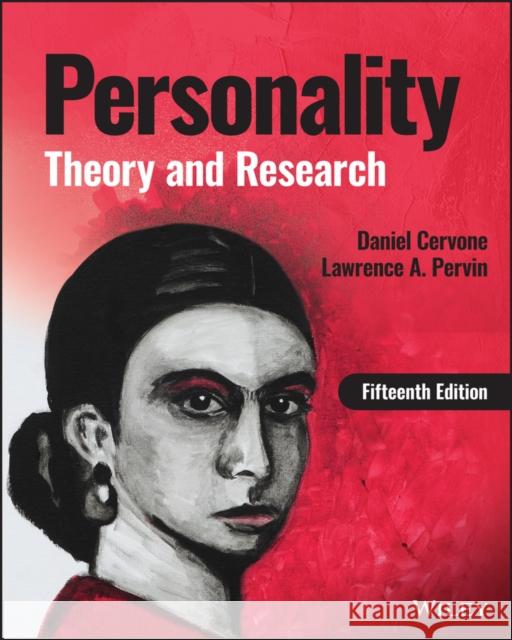Personality: Theory and Research » książka



Personality: Theory and Research
ISBN-13: 9781119891673 / Angielski / Miękka / 2022 / 560 str.
Personality: Theory and Research
ISBN-13: 9781119891673 / Angielski / Miękka / 2022 / 560 str.
(netto: 396,66 VAT: 5%)
Najniższa cena z 30 dni: 412,24
ok. 30 dni roboczych.
Darmowa dostawa!
Glosariusz/słownik
Preface vii1 Personality Theory: From Observation to Scientific Explanation 1Defining Personality, 4Three Goals for the Personality Theorist, 6Answering Questions about Persons Scientifically: Understanding Structures, Processes, Development, and Therapeutic Change, 10Important Issues in Personality Theory, 17Evaluating Personality Theories, 23The Personality Theories: An Introduction, 24Major Concepts, 28Review, 282 The Scientific Study of People 29Personality Research: The Data, 31Personality Research: Research Designs, 35Contemporary Developments in Personality Research: Social Media and Language-Based Assessments, 45Personality Assessment and the Case of Jim, 48Vive la Différence: Conceptual Distinctions in Personality Research, 49Major Concepts, 56Review, 563 A Psychodynamic Theory: Freud's Psychoanalytic Theory of Personality 57Sigmund Freud (1856-1939): A View of the Theorist, 58Freud's View of the Person, 60Freud's View of the Science of Personality, 63Freud's Psychoanalytic Theory of Personality, 64Major Concepts, 87Review, 874 Freud's Psychoanalytic Theory: Applications, Related Theoretical Conceptions, and Contemporary Research 89Psychodynamic Personality Assessment: Projective Tests, 90Psychopathology, 96Psychological Change, 99The Case of Jim, 104Related Theoretical Conceptions, 107Contemporary Developments in Personality Theory: Neuropsychoanalysis, 122Critical Evaluation, 127Major Concepts, 131Review, 1315 A Phenomenological Theory: The Personality Theory of Rogers 133Carl R. Rogers (1902-1987): A View of the Theorist, 135Rogers's View of the Person, 137Rogers's View of the Science of Personality, 139The Personality Theory of Carl Rogers, 140Major Concepts, 153Review, 1536 Rogers's Phenomenological Theory: Applications, Related Theoretical Conceptions, and Contemporary Research 154Clinical Applications, 155The Case of Jim, 162Related Conceptions: Human Potential, Positive Psychology, and Existentialism, 164Developments in Research: The Self and Authenticity, 172Contemporary Developments in Personality Theory: Personality Systems Interaction Theory and the Integrated Self, 179Personality Systems Interaction Theory, 180Illustrative Research, 183Implications for Rogers's Self Theory of Personality, 183Critical Evaluation, 184Major Concepts, 188Review, 1887 Trait Theories of Personality: Allport, Eysenck, and Cattell 189A View of the Trait Theorists, 190Trait Theory's View of the Person, 191Trait Theory's View of the Science of Personality, 192Trait Theories of Personality: Basic Perspectives Shared by Trait Theorists, 194The Trait Theory of Gordon W. Allport (1897-1967), 195Identifying Primary Trait Dimensions: Factor Analysis, 198The Factor-Analytic Trait Theory of Raymond B. Cattell (1905-1998), 200The Three-Factor Theory of Hans J. Eysenck (1916-1997), 204Major Concepts, 212Review, 2128 Trait Theory: The Five-Factor Model and Contemporary Developments 214On Taxonomies of Personality, 215The Five-Factor Model of Personality: Research Evidence, 216Five-Factor Theory, 226Maybe We Missed One? The Six-Factor Model, 229Cross-cultural Research: Are the Big Five Dimensions Universal?, 229Contemporary Developments in Trait Theory: Reinforcement Sensitivity Theory, 234The Case of Jim--Factor-Analytic Trait-Based Assessment, 240The Person-Situation Controversy, 243Critical Evaluation, 245Major Concepts, 249Review, 2499 Behaviorism and The Learning Approaches To Personality 251Behaviorism's View of the Person, 254Behaviorism's View of the Science of Personality, 254Watson, Pavlov, and Classical Conditioning, 258Skinner's Theory of Operant Conditioning, 268Critical Evaluation, 278Major Concepts, 281Review, 28110 A Cognitive Theory: George A. Kelly's Personal Construct Theory of Personality 282George A. Kelly (1905-1966): A View of the Theorist, 285Kelly's View of the Science of Personality, 286Kelly's View of the Person, 287The Personality Theory of George A. Kelly, 288Clinical Applications, 301The Case of Jim, 304Related Points of View and Recent Developments, 305Critical Evaluation, 306Major Concepts, 310Review, 31011 Social-Cognitive Theory: Bandura and Mischel 311Relating Social-Cognitive Theory to Historically Prior Theories, 312A View of the Theorists, 313Social-Cognitive Theory's View of the Person, 316Social-Cognitive Theory's View of the Science of Personality, 317Social-Cognitive Theory of Personality: Structure, 317Social-Cognitive Theory of Personality: Process, 325Social-Cognitive Theory of Growth and Development, 329Major Concepts, 341Review, 34112 Social-Cognitive Theory: Applications, Related Theoretical Conceptions, and Contemporary Developments 342Beliefs About the Self and Self-Schemas, 344Standards of Evaluation and Self-Discrepancies, 352Contemporary Developments in Personality Theory: The KAPA Model, 354Clinical Applications, 361Stress, Coping, and Cognitive Therapy, 366The Case of Jim, 370Critical Evaluation, 372Major Concepts, 375Review, 37513 Culture, Interpersonal Relations, and the Social Foundations of Personality and Its Development 376Persons in Cultures, 378Broad Cultural Differences: Western and Eastern Views of Self, 385Societies within Cultures: Social Practices and Personality Development, 389Personality Development in Socioeconomic Context, 393Personality Functioning Across the Life Span, 396Interpersonal Relationships, 398Putting Personality in Context into Practice, 404Summary, 409Major Concepts, 409Review, 40914 Genes, Brains, and Biological Bases of Personality and its Development 411This illustration shows the location through which an iron rod blasted through the frontal cortex of Phineas Gage--who survived the accident but experienced a profound change in his personality., 412Temperament, 413Evolution, Evolutionary Psychology, and Personality, 436Mood, Emotion, and the Brain, 446Plasticity: Biology as Both Cause and Effect, 451Neuroscientific Investigations of "Higher-Level" Psychological Functions, 452Summary, 453Major Concepts, 453Review, 45315 Assessing Personality Theory and Research 455The Personality Theories: Similarities, Differences, and Integration, 456What an Integrative Theory Might Look Like, 460How Did They Do? A Critical Evaluation of the Personality Theories and Their Research, 461A Final Summing Up: Theories as Toolkits, 466Review, 467Glossary G-1References R-1Author Index I-1Subject Index I-00
Daniel Cervone is Professor of Psychology at the University of Illinois at Chicago. He earned his PhD in Psychology from Stanford University in 1985. In addition to his time at UIC, Dr. Cervone has been a visiting faculty member at the University of Washington and at the University of Rome La Sapienza, and has been a fellow at the Center for Advanced Study in the Behavioral Sciences. He has co-authored or edited numerous volumes in personality science, including Albert Bandura's Social Cognitive Theory: An Agentic Perspective on Human Nature (Wiley, 2023).
1997-2026 DolnySlask.com Agencja Internetowa
KrainaKsiazek.PL - Księgarnia Internetowa









